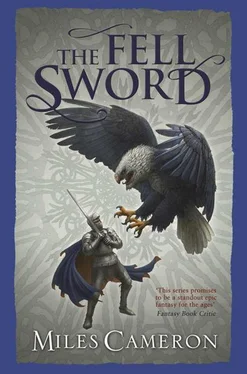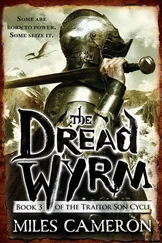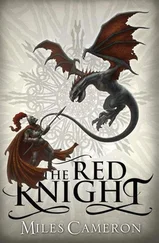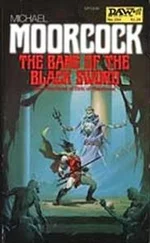Miles Cameron - The Fell Sword
Здесь есть возможность читать онлайн «Miles Cameron - The Fell Sword» весь текст электронной книги совершенно бесплатно (целиком полную версию без сокращений). В некоторых случаях можно слушать аудио, скачать через торрент в формате fb2 и присутствует краткое содержание. Год выпуска: 2014, Издательство: Orion, Жанр: Фэнтези, на английском языке. Описание произведения, (предисловие) а так же отзывы посетителей доступны на портале библиотеки ЛибКат.
- Название:The Fell Sword
- Автор:
- Издательство:Orion
- Жанр:
- Год:2014
- ISBN:нет данных
- Рейтинг книги:5 / 5. Голосов: 1
-
Избранное:Добавить в избранное
- Отзывы:
-
Ваша оценка:
- 100
- 1
- 2
- 3
- 4
- 5
The Fell Sword: краткое содержание, описание и аннотация
Предлагаем к чтению аннотацию, описание, краткое содержание или предисловие (зависит от того, что написал сам автор книги «The Fell Sword»). Если вы не нашли необходимую информацию о книге — напишите в комментариях, мы постараемся отыскать её.
The Fell Sword — читать онлайн бесплатно полную книгу (весь текст) целиком
Ниже представлен текст книги, разбитый по страницам. Система сохранения места последней прочитанной страницы, позволяет с удобством читать онлайн бесплатно книгу «The Fell Sword», без необходимости каждый раз заново искать на чём Вы остановились. Поставьте закладку, и сможете в любой момент перейти на страницу, на которой закончили чтение.
Интервал:
Закладка:
Miles Cameron
The Fell Sword
Prologue
Chapter One
Liviapolis – Morgan Mortirmir
As the Red Knight left the abode of the Wyrm of the Green Hills and rode south to the Inn of Dorling, Morgan Mortirmir, late of Harndon, sat in class in the Imperial capital of Liviapolis.
The classroom in which he sat was over a thousand years old; it featured dark oak benches and solid desks that sat four students per bench. The benches had, carved in so deeply you had to wonder how the professors and tutors had missed the vandalism, the graffiti of a hundred generations of would-be magisters in ten languages and in Archaic itself. The windows were mullioned and leaded and offered only the haziest glimpse of the outside world to the bored or frustrated mind.
Morgan shared his bench with three other students: two of the religious sisters from one of the great cities dozens of convents for women of noble blood, sisters Anna and Katerina, almost invisible in long brown gowns and wimples, and his sole near-friend, the Etruscan whose father was Podesta of the foreign merchants, Antonio Baldesce.
The logik master looked over the class.
‘Someone who is not Mortirmir,’ he said. ‘Tell me why.’
Sixteen students in advanced hermetical thaumaturgy squirmed.
‘Come, come, my children,’ Magister Abraham said. He was a Yahadut – the first Morgon had ever met. He was one of the kindest of the masters – until he felt he had been ignored.
His eyes locked on the young Etruscan. ‘Baldesce?’ he asked, his voice rising a half-octave in academic impatience.
The silence was painful.
‘Let me restate the problem,’ Magister Abraham said in an increasingly dangerous tone. ‘Why can you not wield the hermetical power directly inside your own memory palace?’
Sister Katerina made a slight sound – more like a moan than anything.
Sister Anna bit her lips.
Baldesce was not the sort of boy – young man – to writhe. ‘No idea,’ he said. He shrugged. ‘But if I am permitted to guess-’
‘Don’t,’ Abraham spat. ‘Guesses do not interest me at this stage. Very well, young Mortirmir?’
Mortirmir couldn’t render potentia into ops , but he head read every grimoire available and every scroll of philosophy, ethical or practical, that he could lay hands on. He met the magister’s eye – and hesitated.
If he didn’t give the answer, would they like him better?
Probably not. And sod them, anyway.
‘Magister, I think you can manipulate the aethereal directly inside your own memory palace. I suspect you shouldn’t. ’ Mortirmir shrugged, as Baldesce had shrugged, but it was a different gesture altogether – Mortirmir’s shrug implied there was more to say rather than Baldesce’s indifference to the question.
Magister Abraham scratched his chin under his long beard, his eyes on Mortirmir. ‘Why do you think such an odd and heretical thing?’ he asked. He was trying – and failing – to hide that he was pleased.
‘Vetronius’s Gladius Capitalis. Heraklitus’s θανατηφόρα σπαθί.’
Sister Anna winced at his pronunciation of High Archaic, which was the Alban and not the local Morean.
Magister Abraham had the odd habit of tapping his teeth with his fingers, and he did so. When he had ink in his fingers, he sometimes stained his teeth.
He nodded. ‘Yes. The Fell Sword. A weapon that will perform the same way in the real and in the aethereal implies that it can be forged inside the memory palace and then used – anywhere.’ He allowed himself a slight smile. ‘What would be the – result? – of such a use inside the memory palace?’
He paused for a heartbeat, and fifteen students paled to think of the literal destruction of the carefuly tended memories and workings.
‘But you wouldn’t know, would you, Mortirmir?’ Magister Abraham asked. It was a rhetorical question. Now it was the magister’s turn to shrug. ‘Scamper off, little ones. Alchemy is waiting for you. Mortirmir, stay.’
The other students hurried out, many with heads bent to avoid catching the master’s eye. He sometimes issued work at the end – massive lightning strikes of work, carefully or carelessly applied.
Mortirmir sat and fiddled with his paternoster until the last student left, and then rose as gracefully as his fast-growing body could manage and went to face the master.
The older man frowned. ‘You have a brilliant mind,’ he said. ‘And you work harder than most of these louts.’ He shrugged, and handed Mortirmir a rolled scroll. ‘I’m sorry, young man. Sorry to twit you on your failings, and sorry to have to give you this.’
Mortirmir didn’t even need to open it. ‘Summons? From the Patriarch?’
The magister nodded, and left the classroom. As he opened the door, Morirmir heard Baldesce’s voice, and Zervas – another Morean student – say something – and they all laughed.
He had no way to know if they were talking about him, but he hated them all in that moment.
The summons in his hand meant that he would be tested one more time for powers, and if he could muster none, he’d be sent forth. He’d worked his whole life to come here.
And now, he’d failed.
Sometimes it can be very difficult to be a child prodigy.
Morgan Mortirmir was sixteen and growing so fast that none of his clothes fit properly. His face was so young that despite his size, he could, at times, easily pass for twelve. He was tall and thin, but not in the way that might have given him authority or dignity. He was gawky and, even worse, covered in adolescent acne that burst constantly into white-headed pustules all over his face, so that the Morean sisters in his Practical Philosophy class called him ‘the Plague’.
And Morgan knew he was the Plague. He was too young to be at the school and worst of all – and for all his phenomenal intelligence – he lacked any ability to manipulate the world directly through phantasmia or even through alchemy. He had all the potential in the world.
He just couldn’t get a grip on the raw stuff of power. He couldn’t make potentia into ops.
But he was intelligent enough to know when he was not wanted. And no one in the great school of Higher Philosophy and Metaphysics wanted any part of him except as a scapegoat. They didn’t want him to quote the authorities he’d memorised, or to explain to them the fine points of how the aethereal worked in terms of mathmaticka. They wanted him to wield power, or leave.
He sat in a small tavern in the greatest city in the civilised world and stared into a cup of wine.
After a while, he stared into another.
And then a third.
All day, every day, his magisters had thrust him into situations meant to unlock his powers. His ability to detect a casting – even the faintest emanations from Cravenfish, for example – earned him praise from the magisters. Every one of them agreed that he ought to have talent. His score on potentia was – phenomenal.
But they’d ceased to say it so loudly or so often. And today the Patriarch, who had to review each candidate for admission, and pass him as theologically reliable before granting a degree, had sent for him.
Sunday next.
Mortirmir bit his lip to keep from crying, but it didn’t work and he wept. It was bitter, stupid self-pity, and he hated the sheer childishness of it even as he wept harder. The Patriarch would send him home.
Home wasn’t even so bad. It simply represented the loss of everything he’d ever wanted. He wanted Liviapolis – magnificent women clad in glittering artifice talking about philosophy with men who wrote books rather than swung swords. Here, not barbaric Harndon, was where he belonged.
Читать дальшеИнтервал:
Закладка:
Похожие книги на «The Fell Sword»
Представляем Вашему вниманию похожие книги на «The Fell Sword» списком для выбора. Мы отобрали схожую по названию и смыслу литературу в надежде предоставить читателям больше вариантов отыскать новые, интересные, ещё непрочитанные произведения.
Обсуждение, отзывы о книге «The Fell Sword» и просто собственные мнения читателей. Оставьте ваши комментарии, напишите, что Вы думаете о произведении, его смысле или главных героях. Укажите что конкретно понравилось, а что нет, и почему Вы так считаете.












